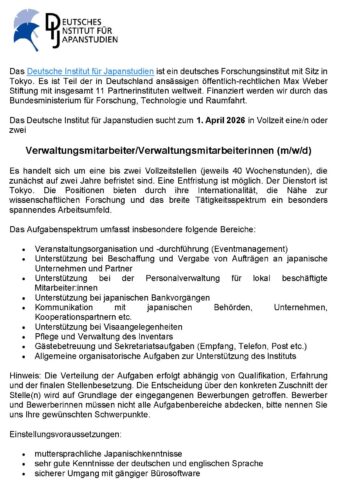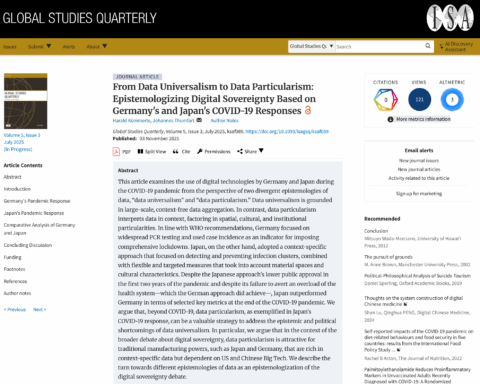Events and Activities
DIJ Newsletter Winter 2025/26
 Innovation, games, machizukuri, climate, and ‘the mouse’: the winter issue of our DIJ Newsletter features updates on our research, publications, and events as well as news from the Institute, our team, and our outreach activities. We hope you will enjoy exploring this new edition of the DIJ Newsletter. If you haven’t done so yet, you can subscribe to receive our Newsletters directly to your inbox. The full issues and subscription form are available here.
Innovation, games, machizukuri, climate, and ‘the mouse’: the winter issue of our DIJ Newsletter features updates on our research, publications, and events as well as news from the Institute, our team, and our outreach activities. We hope you will enjoy exploring this new edition of the DIJ Newsletter. If you haven’t done so yet, you can subscribe to receive our Newsletters directly to your inbox. The full issues and subscription form are available here.
Stellenausschreibung Verwaltungsmitarbeiter/Verwaltungsmitarbeiterinnen (m/w/d)
 Werden Sie Teil des DIJ-Teams in unserer Verwaltung! Die ausgeschriebenen Stellen umfassen insbesondere folgende Aufgaben: Veranstaltungsorganisation und -durchführung (Eventmanagement); Unterstützung bei Beschaffung und Vergabe von Aufträgen an japanische Unternehmen und Partner; Unterstützung bei der Personalverwaltung, bei japanischen Bankvorgängen und Visaangelegenheiten; Kommunikation mit japanischen Behörden, Unternehmen, Kooperationspartnern; Pflege und Verwaltung des Inventars; Gästebetreuung und Sekretariatsaufgaben (Empfang, Telefon, Post etc.); allgemeine organisatorische Aufgaben zur Unterstützung des Instituts. Wenn Sie muttersprachliche Japanischkenntnisse sowie sehr gute Kenntnisse der deutschen und englischen Sprache haben sowie sicher sind im Umgang mit Bürosoftware, freuen wir uns auf Ihre Bewerbung bis zum 8. Januar 2026. Die vollständige Ausschreibung finden Sie hier auf Deutsch und auf Japanisch.
Werden Sie Teil des DIJ-Teams in unserer Verwaltung! Die ausgeschriebenen Stellen umfassen insbesondere folgende Aufgaben: Veranstaltungsorganisation und -durchführung (Eventmanagement); Unterstützung bei Beschaffung und Vergabe von Aufträgen an japanische Unternehmen und Partner; Unterstützung bei der Personalverwaltung, bei japanischen Bankvorgängen und Visaangelegenheiten; Kommunikation mit japanischen Behörden, Unternehmen, Kooperationspartnern; Pflege und Verwaltung des Inventars; Gästebetreuung und Sekretariatsaufgaben (Empfang, Telefon, Post etc.); allgemeine organisatorische Aufgaben zur Unterstützung des Instituts. Wenn Sie muttersprachliche Japanischkenntnisse sowie sehr gute Kenntnisse der deutschen und englischen Sprache haben sowie sicher sind im Umgang mit Bürosoftware, freuen wir uns auf Ihre Bewerbung bis zum 8. Januar 2026. Die vollständige Ausschreibung finden Sie hier auf Deutsch und auf Japanisch.
New book chapter and article by Harald Kümmerle on Mathematical Knowledge and Digital Sovereignty

Two new studies by DIJ researcher Harald Kümmerle were recently published. His book chapter “Bridging Göttingen and Tokyo: Oral Culture and the Dynamics of Mathematical Knowledge”, published in Felix Klein’s Foreign Students. Opening Up the Way for Transnational Mathematics (Birkhäuser Cham 2025), examines the reception of Felix Klein’s school of mathematical productivity in Japan, particularly at Tokyo Imperial University, whose central position within Japan contrasts with Göttingen University’s peripheral position within Germany. The study focuses on the work of two Japanese mathematicians, Tsuruichi Hayashi and Takuji Yoshiye. Harald’s article “Datenströme und Raumordnung. Japans Regulierungsmodell im globalen Kontext” (Data flows and spatial order. Japan’s regulatory model in a global context), published in German in the Zeitschrift für Digitalisierung und Recht (4/2025), studies how data flows are embedded in geographical and economic orders and constitute spaces themselves. Focusing on developments in Japan, the article shows that data flows are not only technical or regulatory objects, but space-constituting phenomena in which Japan’s consensus-oriented regulatory model appears as a relevant factor in global order-making.
DIJ Expertise on Japanese Economy and Society in German Media

For German media Deutsche Welle (DW) and Deutschlandfunk (DLF), Franz Waldenberger and Sebastian Polak-Rottmann have contributed their expertise in the fields of Japan’s economy and society, respectively. In a DW online article on Japan’s monetary policy, Franz Waldenberger explained that while the Japanese government was highly indebted, the economy as a whole was “rich”. Japan’s share of net foreign assets as percentage of GDP was “among the highest in the world”, he said. “I call it ‘rich country, poor government'”. In a German-language DLF radio feature on the problem of Japan’s abandoned houses (akiya mondai), Sebastian Polak-Rottmann commented on abandoned houses are “a symptom of demographic change and of migration” that could be observed both in rural and in urban areas. Since empty houses in rural areas often had strong family ties for their owners, many did not want to sell them, he explained.
Open access article co-authored by Harald Kümmerle studies use of digital technologies by Germany and Japan
 How have Germany and Japan used digital technologies during the COVID-19 pandemic? From the perspective of two divergent epistemologies of data, the open access article “From Data Universalism to Data Particularism: Epistemologizing Digital Sovereignty Based on Germany’s and Japan’s COVID-19 Responses” (Global Studies Quarterly, Vol. 5, Issue 3) by DIJ’s Harald Kümmerle and (Brussels) compares both countries’ use of data and their responses to the pandemic. Observing that Japan outperformed Germany in terms of selected key metrics at the end of the COVID-19 pandemic, the article argues that data particularism, as exemplified in Japan’s COVID-19 response, can be a valuable strategy to address the epistemic and political shortcomings of data universalism. In particular, the authors argue that in the context of the broader debate about digital sovereignty, data particularism is attractive for traditional manufacturing powers, such as Japan and Germany, that are rich in context-specific data but dependent on US and Chinese Big Tech.
How have Germany and Japan used digital technologies during the COVID-19 pandemic? From the perspective of two divergent epistemologies of data, the open access article “From Data Universalism to Data Particularism: Epistemologizing Digital Sovereignty Based on Germany’s and Japan’s COVID-19 Responses” (Global Studies Quarterly, Vol. 5, Issue 3) by DIJ’s Harald Kümmerle and (Brussels) compares both countries’ use of data and their responses to the pandemic. Observing that Japan outperformed Germany in terms of selected key metrics at the end of the COVID-19 pandemic, the article argues that data particularism, as exemplified in Japan’s COVID-19 response, can be a valuable strategy to address the epistemic and political shortcomings of data universalism. In particular, the authors argue that in the context of the broader debate about digital sovereignty, data particularism is attractive for traditional manufacturing powers, such as Japan and Germany, that are rich in context-specific data but dependent on US and Chinese Big Tech.
Harald Kümmerle interviewed about Japanese digital strategy
-480x435.jpg)
“Japan’s digital policy is consensus-driven, differing from both Western and Chinese approaches”, says DIJ researcher Harald Kümmerle in a recent interview with Nikkei X-Tech, an online news portal of Japanese newspaper Nikkei Shinbun. Building on a widely recognised classification of global digital governance into three ideal types – market-driven (US), state-driven (China), and rights-driven (EU) – Kümmerle proposes Japan’s consensus-driven model as a distinct fourth type. This model, he argues, is characterized by soft regulation and administrative guidance rather than formal rule-making. This provides both opportunities and challenges. As Harald notes in the interview, “If Japan can expand its circle of partners among Indo-Pacific nations in the field of economic security, it may be able to mediate between the EU and the US.” The article (in Japanese) is available here.
Hybrid DIJ Study Group on the Political Economy of U.S. Military Bases
 This talk provides an overview of the economic and political impacts of the presence of U.S. military bases in Japan. International relations research has traditionally examined U.S. bases qualitatively, treating them as an outcome of U.S. global security strategy. In contrast, military economics focus on the economic effects of base closures and realignments in the United States and Europe. Studies examining the impact of U.S. bases on Japan remain scarce. This research addresses this gap by presenting the historical and strategic background of U.S. bases in Japan, alongside empirical evidence and case studies that illustrate the effects of these bases on surrounding communities. The project employs a mixed-methods design and explores the relationship between U.S. bases and Japanese municipalities using the original dataset “The United States Bases in Japan”, which draws on a wide range of primary and secondary sources. Details and registration here
This talk provides an overview of the economic and political impacts of the presence of U.S. military bases in Japan. International relations research has traditionally examined U.S. bases qualitatively, treating them as an outcome of U.S. global security strategy. In contrast, military economics focus on the economic effects of base closures and realignments in the United States and Europe. Studies examining the impact of U.S. bases on Japan remain scarce. This research addresses this gap by presenting the historical and strategic background of U.S. bases in Japan, alongside empirical evidence and case studies that illustrate the effects of these bases on surrounding communities. The project employs a mixed-methods design and explores the relationship between U.S. bases and Japanese municipalities using the original dataset “The United States Bases in Japan”, which draws on a wide range of primary and secondary sources. Details and registration here
Hybrid DIJ Study Group on Industrial Policy and Technology Transfer in Postwar Japan

Was the postwar economic miracle a result of the Japanese government’s industrial policy, or did it occur despite it? Numerous studies on the effects of government policy on industrial growth have produced contradictory or inconclusive findings. In this talk, Krautter argues that one of the main instruments of industrial policy toward growth industries was the licensing system for technology imports. Focusing on technology policy, he finds that the licensing system positively influenced the terms and conditions of technology imports. Krautter contends that the government’s role in postwar industrial development was more that of a coordinator rather than of a “leader” or “guide.” This view is reflected in the description of the Japanese state as a coordination state, contrasting with the well-known concept of the developmental state. Details and registration here





 Open Access
Open Access
